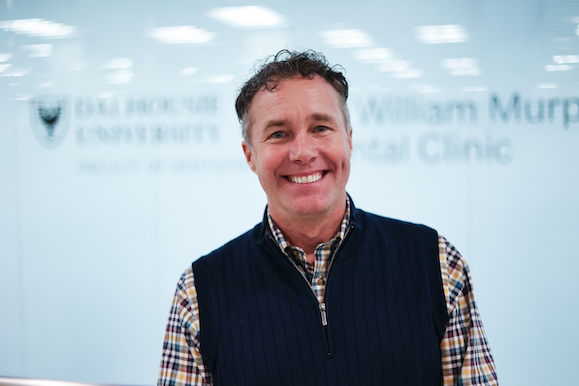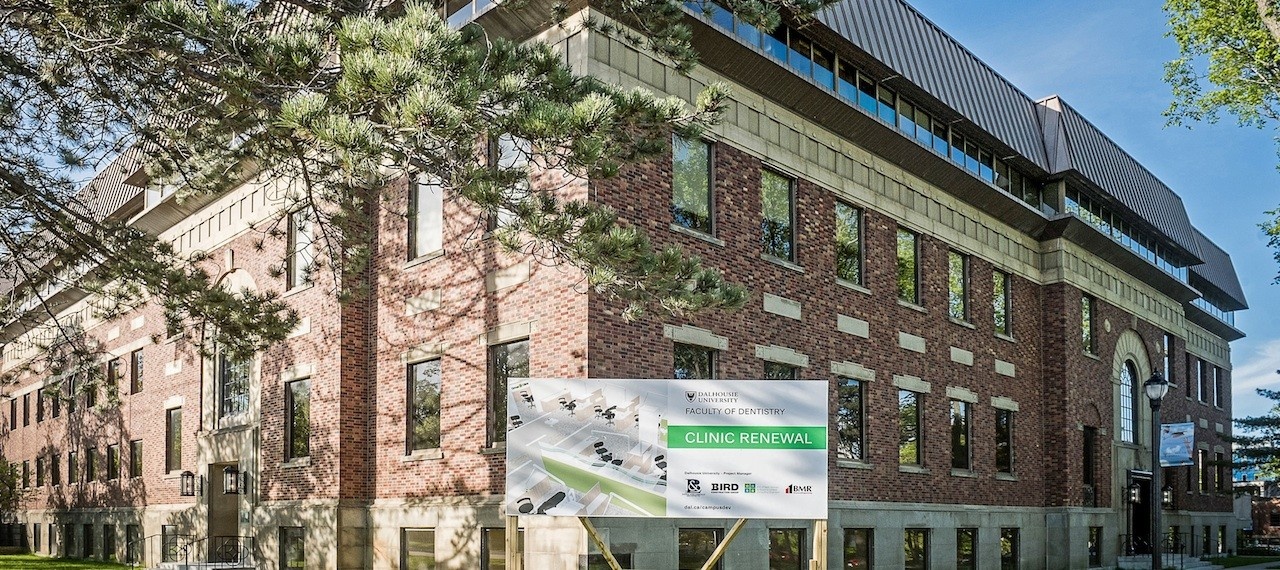News
» Go to news main2024 JD McLean Lecture: An interview with Bob Hope
 (Photo by Bruce Bottomley)
(Photo by Bruce Bottomley)
The 2024 J D McLean speaker is Bob Hope, president of TimeShift Solutions – a consultancy for dental practices – and a competitor in the Amazing Race Canada 2014. Self-knowledge and personal accountability have a big role to play in healthy workplaces and business growth, he says.
Q: Can you please talk about your work, and particularly your work with dental practices? What do you try to help people with?
A: I've been involved in dentistry for over 30 years in many capacities. But if you were to distill it down to one word, it would be growth. Most people naturally think of growth of a business – and there's truth to that. We want to build in efficiencies to help a business grow and become more profitable. But I am also interested in the growth of the individuals who run the business. That means accountability: owning our work and learning how to work with people with whom we may not always agree or get along with. Sometimes in our work environment, we bump elbows with others and it’s important to appreciate differences and be open to learning new perspectives – including things about ourselves. That's where the personal growth comes. When individuals in the organization feel empowered, understood, and valued, that has an impact on the growth of the business. Because if people are not empowered or feel supported, they will work against the interest of the business. They won’t do this deliberately, but they won’t stay in their jobs or have good working relationships, which makes it more of a struggle for the business to grow.
My initial focus is the people. That might involve developing better ways to work together, identifying differences, and seeing differences as strengths, as opposed to flaws or problems. At the same time, we have an agenda for the growth of the business, including systems, efficiencies, and so on. But it's got to start with the people.
Q: How would you describe your role?
A: Generically, people consider me a consultant, but I call myself a coach. For me, that means inspiring others rather than finger-waving and saying "you must do it this way". An individual is not just the result of what somebody told them to do. Ideally, they make their own decisions and own them. They reflect when things don’t go as well as expected, try to understand what could have gone better, and then try again.
At the lecture, I'll be discussing some of my experiences from competitive rowing. For example, when you are part of a team, it can be easy to play the blame game and look for flaws in others. But when biofeedback shows you that you are also making mistakes, you have to be accountable. You need to focus on your role and what you can control to improve the collective, as opposed to pointing out the flaws of others.
When we take that sort of dynamic and put it in a dental office context, you may work with individuals who are not your best friends, but you have to figure it out how to work together. That's where I invite individuals to have a certain level of introspection, which means looking at situations that didn't go well and helping them to understand how they co-own that result. If it's never our fault, we miss an opportunity to learn. In the lecture, one of the things I’ll explore is what happens if we hit the rewind button and do something differently to bring about a more positive outcome.
Q: What were your initial thoughts when you received an invitation to give a lecture to a group of oral health students?
A: I was thrilled to get this opportunity because I'm capturing an audience at a unique inflection point in their lives, where they're beginning to take on more ownership of their lives and actions. Up until now, they’ve been under the intense scrutiny or supervision of parents, teachers, and university professors. This is a turning point for them.
Over the course of our lives, we've all known individuals who had a profound impact on our lives. So when I was asked to do this lecture, I thought to myself, well, what do I wish somebody told me when I was in my 20s that could have helped me deal with some of the difficult situations we encounter – which are part of life. I'm hoping that I can provide some pearls of wisdom and insights.
Q: Can you talk a bit about what the lecture will cover?
A: For decades, my focus has been predominantly on the business side of dentistry – going into existing clinics and putting systems in place. But I’m also interested in the human side. In this industry, we tend to focus on what goes on in the mouth. I like to know what's going on in the minds of people. What's their experience and perspective? Without giving too much away, the lecture will explore the human side of dentistry and the people and communication skills that are part of whatever we do in or outside of a dental office.
Q: You have spent quite a bit of time teaching oral health care students. What are some of the topics you cover and why are they important?
A: I’ve taught communication and psycho-social skills at the Toronto College of Dental Hygiene, with the objective of helping to balance all the clinical work the students do. I'm also a certified practitioner of the Myers Briggs Type Indicator, which is a personality profiling system that helps us to discover what is natural for each of us – because we all take information from the world around us and formulate decisions around that information. And we do that in either an introverted or extroverted way. I incorporate the Myers Briggs personality profiling as part of my curriculum to give students the self knowledge to help them understand how they make decisions and handle particular situations, and to know in what areas they are weaker. It also helps make them aware that other people are different – and that’s a good thing.
My curriculum also covers something called motivational interviewing, which I’ll talk about in the lecture. In dentistry and hygiene, we tend to ask a lot of yes/no questions. Do you brush? Do you floss? The yes/no answers we receive don’t really tell us much. Motivational interviewing uses more open-ended questions to get closer to the truth of what we’re trying to find out. So I might say to the patient, "Tell me how you look after your teeth and gums now." If the patient says, "I brush" I might ask them whether they use a manual or an electric toothbrush or I may ask them to show me how they brush. I might also get a patient to look at some photos of their teeth and tell me on a scale of one to 10 how healthy they feel their teeth and gums are. The appointment will carry on in that way with the patient involved in the diagnosis and their role in the health of their teeth and mouth.
Q: A lot of our students come back to teach. For those who are thinking about it, what advice would you give?
I would say two things. Number one is be passionate, because your passion and enthusiasm are contagious. We've all sat through lectures or courses where someone speaks in a monotone and we just zone out. And the second thing I would say is, be fluid. Don't be regimented. During the years I taught, I had 15 different class intakes and over those 15 intakes the curriculum was never the same. It was because I learned every single time I taught that course. I tweaked and fixed things that didn't work. I took on the responsibility on myself, because ultimately, the results of my students were a reflection of how I presented. Not everyone learns the same way. If I didn't adapt to their learning style, then I was failing them. Of course, you can’t teach a class 14 different ways, but if you find somebody struggling, then you might have a one-on-one with them, to do some follow-up or explain things in a different way. I always find that the results of the class are a direct result of my job. Now, students may not have attended classes or paid attention. Sure, that happens, too. I invite accountability. Me included. The main message is to be passionate and fluid, observe and self-assess your work, learn, tweak, and change, and then reevaluate the next time you do it.
It’s also important to remember that not everybody is a natural right out of the gate. Teaching can be awkward and difficult at first. But the great thing is that the students who want to be teachers have been inspired by their teachers and they want to pass on what they had as students.
Q: What are your thoughts about the ongoing effects of the pandemic and how has it changed us?
A: The pandemic has been hard on people psychologically and it's added a whole layer of complication for dental practices. We all went through a period – not just during the shutdown – of intense isolation. And from that came fear, exhaustion (especially in the health-care industry), impatience, and intolerance. People also got used to that time off. You may have heard of the great resignation. That was because, during COVID, people were re-evaluating what’s important to them and whether they want to work that hard anymore. I’ve noticed that some of the oral health workforce left private practices and worked for temp agencies because they could set their own hours. As a result, practices have been struggling to find staff who will stay.
But I think things are changing now. I believe we have a natural yearning for meaningful connection and that’s going to prevail. What drew most of us to oral health care in the first place is that it's a people industry and we want to look after each other. People who have been temping for the last couple of years are saying that they miss the relationships with their patients and the satisfaction of seeing their progress. We all treaded water to a certain extent during the worst of COVID-19, but I believe a reset is taking place now. We want to be part of teams again.
Q: What information or advice would you like the audience at the J D McLean lecture on January 18 to take with them into their daily lives?
I’ll share some of my lessons from competitive rowing and from my participation in season 2 of the Amazing Race Canada. Along the way, I hope I can invite people to consider being more introspective and to turn the mirror on themselves. It's always easy to point the finger and blame someone else. But in a situation that hasn’t turned out as well as you'd like, you need to look at yourself and understand what your component was. We all have flaws and weaknesses, but the more we become aware of what those are for us, the more we will seek to adapt or even overcome them. And I’d like people to be more appreciative of the journey that others are on as well.
Register for the 2024 J D McLean Lecture on January 18.
Recent News
- Our 2024 OAA recipients
- Grad profile: Haider Hussain
- Grad profile: Mariam El‑Aghil
- Grad profile: Annie Jacob
- Jillian Bishop receives the 2024 Dr. D. S. Precious Gold Medal in Dentistry
- Meet Dr. Frank Lovely, Golden Eagle Lifetime Achievement Award for 2024
- Grad profile: Autumn Penney
- In conversation with Anna Quon
